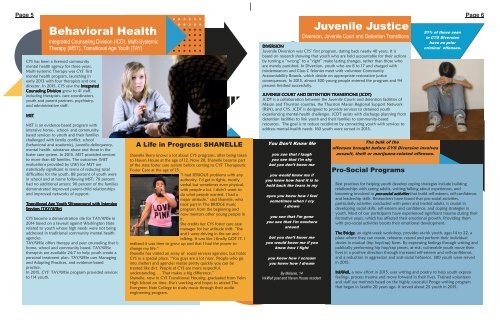A Closer Look at Our Programs
The CYS 2015 Annual Report serves as a guide to understanding our unique and effective continuum of care, changing the lives of homeless and other at-risk youth daily.
The CYS 2015 Annual Report serves as a guide to understanding our unique and effective continuum of care, changing the lives of homeless and other at-risk youth daily.
You also want an ePaper? Increase the reach of your titles
YUMPU automatically turns print PDFs into web optimized ePapers that Google loves.
Page 5<br />
Behavioral Health<br />
Integr<strong>at</strong>ed Counseling Division (ICD), Multi-Systemic<br />
Therapy (MST), Transitional Age Youth (TAY)<br />
CYS has been a licensed community<br />
mental health agency for three years.<br />
Multi-systemic Therapy was CYS’ first<br />
mental health program, launching in<br />
early 2013 with four therapists and one<br />
director. In 2015, CYS saw the Integr<strong>at</strong>ed<br />
Counseling Division grow to 41 staff,<br />
including therapists, care coordin<strong>at</strong>ors,<br />
youth and parent partners, psychi<strong>at</strong>ry,<br />
and administr<strong>at</strong>ive staff.<br />
MST<br />
MST is an evidence-based program with<br />
intensive home-, school- and communitybased<br />
services to youth and their families<br />
challenged with family conflict, school<br />
(behavioral and academic), juvenile delinquency,<br />
mental health, substance abuse and those in the<br />
foster care system. In 2015, MST provided services<br />
to more than 60 families. The outcomes (MST<br />
evalu<strong>at</strong>ions provided by UW) for MST are<br />
st<strong>at</strong>istically significant in terms of reducing total<br />
difficulties for the youth. 88 percent of youth were<br />
in school and <strong>at</strong> home following MST; 78 percent<br />
had no additional arrests; 90 percent of the families<br />
demonstr<strong>at</strong>ed improved parent-child rel<strong>at</strong>ionships<br />
and improved networks of support.<br />
Transitional Age Youth Wraparound with Intensive<br />
Services (TAY/WISe)<br />
CYS became a demonstr<strong>at</strong>ion site for TAY/WISe in<br />
2014 based on a lawsuit against Washington St<strong>at</strong>e<br />
rel<strong>at</strong>ed to youth whose high needs were not being<br />
addressed in traditional community mental health<br />
agencies.<br />
TAY/WISe offers therapy and peer counseling th<strong>at</strong> is<br />
home, school and community based. TAY/WISe<br />
therapists are available 24/7 to help youth cre<strong>at</strong>e a<br />
personal tre<strong>at</strong>ment plan. TAY/WISe uses Managing<br />
and Adapting Practices, and evidence-based<br />
practice.<br />
In 2015, CYS’ TAY/WISe program provided services<br />
to 114 youth.<br />
A Life in Progress: SHANELLE<br />
Shanelle Berry knows a lot about CYS programs, after being taken<br />
to Haven House <strong>at</strong> the age of 12. Now 20, Shanelle became part<br />
of the st<strong>at</strong>e foster care system before coming to CYS’ Therapeutic<br />
Foster Care <strong>at</strong> the age of 15.<br />
“I had SERIOUS problems with any<br />
authority. I’d get in fights, mostly<br />
verbal but sometimes even physical,<br />
with people a lot. I didn’t want to<br />
do wh<strong>at</strong> people wanted. I had a<br />
major <strong>at</strong>titude,” said Shanelle, who<br />
took part in The BRIDGE music<br />
program from the beginning and<br />
now mentors other young people in<br />
it.<br />
She credits her CYS foster care case<br />
manager for her <strong>at</strong>titude shift. “She<br />
and I were driving in the car and<br />
talking. It was like I finally GOT IT. I<br />
realized it was time to grow up and th<strong>at</strong> I had the power to<br />
change my life.”<br />
Shanelle has visited an array of social services agencies, but holds<br />
CYS in a special place. “You guys are a lot nicer. People who go<br />
into shelters and agencies realize pretty quickly you can be<br />
tre<strong>at</strong>ed like dirt. People <strong>at</strong> CYS are more respectful,<br />
understanding. . . Th<strong>at</strong> makes a big difference.”<br />
Shanelle, now in CYS Transitional Housing, gradu<strong>at</strong>ed from Yelm<br />
High School on time. She’s working and hopes to <strong>at</strong>tend The<br />
Evergreen St<strong>at</strong>e College to study music through their audio<br />
engineering program.<br />
Juvenile Justice<br />
Diversion, Juvenile Court and Detention Transitions<br />
DIVERSION<br />
Juvenile Diversion was CYS’ first program, d<strong>at</strong>ing back nearly 40 years. It is<br />
based on research showing th<strong>at</strong> youth who are held accountable for their actions<br />
by turning a “wrong” to a “right” make lasting changes, r<strong>at</strong>her than those who<br />
are merely punished. In Diversion, youth who are 8 to 17 and charged with<br />
misdemeanors and Class C felonies meet with volunteer Community<br />
Accountability Boards, which decide on appropri<strong>at</strong>e restor<strong>at</strong>ive justice<br />
consequences. In 2015, almost 300 young people entered the program and 94<br />
percent finished successfully.<br />
JUVENILE COURT AND DETENTION TRANSITIONS (JCDT)<br />
JCDT is a collabor<strong>at</strong>ion between the Juvenile Courts and detention facilities of<br />
Mason and Thurston counties, the Thurston Mason Regional Support Network<br />
(RSN), and CYS. JCDT is designed to provide services to detained youth<br />
experiencing mental-health challenges. JCDT assists with discharge planning from<br />
detention facilities to link youth and their families to community-based<br />
resources. The goal is to reduce recidivism by connecting youth with services to<br />
address mental-health needs. 160 youth were served in 2015.<br />
You Don’t Know Me<br />
you see th<strong>at</strong> I laugh<br />
you see th<strong>at</strong> I’m shy<br />
but you don’t know me<br />
you would know me if<br />
you knew how hard it is to<br />
hold back the tears in my<br />
eyes you knew how I feel<br />
sometimes when I cry<br />
I drown<br />
you see th<strong>at</strong> I’m gone<br />
you see th<strong>at</strong> I’m nowhere<br />
around<br />
but you don’t know me<br />
you would know me if you<br />
knew how I fight<br />
you knew how I scream<br />
you knew how I dream<br />
By Melanie, 14<br />
InkWell poet and Haven House resident<br />
The bulk of the<br />
offenses brought before CYS Diversion involves<br />
assault, theft or marijuana-rel<strong>at</strong>ed offenses.<br />
Pro-Social <strong>Programs</strong><br />
91% of those seen<br />
in CYS Diversion<br />
have no prior<br />
criminal offenses.<br />
Page 6<br />
Best practices for helping youth develop coping str<strong>at</strong>egies include building<br />
rel<strong>at</strong>ionships with caring adults, writing/talking about experiences, and<br />
becoming involved in pro-social activities th<strong>at</strong> build self-esteem, self-confidence,<br />
and leadership skills. Researchers have found th<strong>at</strong> pro-social activities,<br />
particularly activities conducted with peers and trusted adults, is crucial in<br />
developing social skills, self-esteem and confidence, and coping str<strong>at</strong>egies in<br />
youth. Most of our participants have experienced significant trauma during their<br />
form<strong>at</strong>ive years, which has affected their emotional growth. Providing them<br />
with pro-social activities boosts their emotional development.<br />
The Bridge, an eight-week workshop, provides <strong>at</strong>-risk youth, ages 14 to 22, a<br />
place where they can cre<strong>at</strong>e, rehearse, record and perform their individual<br />
stories in musical (hip hop/rap) form. By expressing feelings through writing and<br />
publically performing hip hop/rap pieces, <strong>at</strong>-risk, vulnerable youth move their<br />
lives in a positive direction through increased self-esteem and self-confidence,<br />
and a reduction in aggression and anti-social behavior. 300 youth were served<br />
in 2015.<br />
InkWell, a new effort in 2015, uses writing and poetry to help youth express<br />
feelings, process trauma and move forward in their lives. Trained volunteers<br />
and staff use methods based on the highly successful Pongo writing program<br />
th<strong>at</strong> began in Se<strong>at</strong>tle 20 years ago. It served about 25 youth in 2015.



